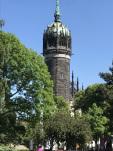Why on earth do religious events that happened abroad five hundred years ago have any significance for today’s world? Or for the church? Remember, France and Italy worked hard to omit any reference to the Christian history of Europe from the preamble to the Lisbon Treaty – purely for ideological reasons. How stupid can intelligent people get? You don’t have to sympathise with that history, but to write it out looks suspiciously like blanking Trotsky from the photos.
Well, I am in Wittenberg for an academic conference that goes with the exciting title of Faith and Theology: Basic Insights of the Reformation in Ecumenical Debate. Theologians from around the world have come together to explore from different perspectives how the legacy of the Lutheran Reformation speaks into the situation faced by the church today. In fact, after two introductory lectures – which demonstrated immediately the different cultural approaches to theological method in Germany and the USA – we broke into groups to consider the necessary contextualisation of faith and theology. My group heard from a Brazilian and an Indian who teaches in Australia.
One of the concerns that runs though the conference is a worrying tendency

Tomorrow morning we will pray together in the Schlosskirche, onto whose doors Martin Luther allegedly nailed his 95 Theses on 31 October 1517. Later we shall explore questions of faith, theology and exegesis, followed later with consideration of faith, theology and human action. We then continue into Thursday when the conference will end with papers on the ecumenical challenges presented by the Roman Catholic Archbishop of Berlin, the Ratsvorsitzende of the EKD, and me.
If it doesn’t sound very exciting, all I can say is: you have to be here. It is intellectually stimulating, theologically challenging, and the people are really nice to know.
